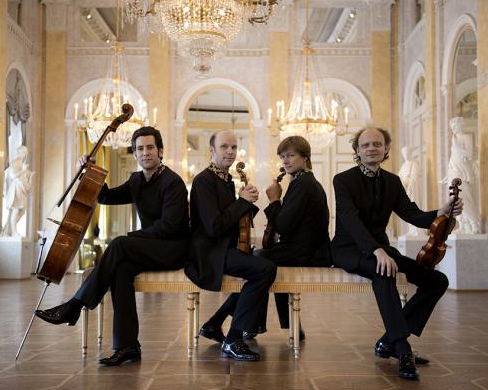Hugo Wolf Quartet brings dramatic intensity to Smetana
No one could accuse the Hugo Wolf Quartet of underplaying the drama of Smetana’s String Quartet No. 1.
From the abrupt crash of the opening chord, this was a vivid, assertive performance. The four musicians hammered away at the three-note motif that dominates the opening movement of a work intended to evoke the composer’s journey through life.
The quartet, formed in Vienna in 1993, performed Saturday at the University of Miami’s Gusman Hall, in a concert presented by Friends of Chamber Music of Miami. For the two major works on the program, they traveled north of Vienna to 19th-century Prague, home of Bedřich Smetana. The composer, best known for his operas and tone poem Ma Vlast, is considered the father of Czech classical music, and a significant influence on his younger colleague, Antonín Dvořák, whom most would regard as that country’s greatest composer.
The Wolf Quartet’s performance was not notable for perfect intonation or blemish-free surfaces. But in the Smetana quartet, subtitled “From my life,” which portrays the composer’s triumphs and travails from romantic love to hearing loss, they brought as much of a sense of storytelling as possible to an abstract musical form.
It wasn’t all fire and thundering chords. The four musicians relaxed into the mellow passages, playing with the nostalgic wistfulness of a man looking back at happier times. Of particular note was the work of violist Thomas Selditz, whose dark, lean tone brought a distinctive color to the performance.
In the second movement Polka, they played with an earthy, bumptious aggressiveness that brought the ensemble to the edge of crudeness, not a bad place to be in a rustic movement inspired by a popular dance of the composer’s childhood.
After the noisy thumping of the Polka, the musicians gave a radiant performance of the Largo, with a masterfully constructed crescendo to a weighty climax and a sensitive performance by first violinist Sebastian Gürtler of the long melodic passages that dominate the movement, full of yearning and a sense of time past.
They closed the first half of the concert with a work by the composer from whom they took their name, Hugo Wolf’s Italian Serenade. The musicians gave this brief work, full of satirical humor and manic energy, a performance of spiky precision, with an ironic edge.
The concert ended with Dvořák’s String Quartet No. 14, his last work in the genre. The ensemble gave a performance that was much smoother and more refined than the Smetana, with a warm ensemble tone in Dvořák’s rich harmonies. But there was a lack of precision to the performance, with first violinist Gürtler at times playing in an unsteady manner, with unreliable intonation in both first and last movements.
They were at their best in the long, flowing melodies with which the composer fills the work, such as the slow middle section of the Molto vivace movement and the slow third movement, where Gürtler played with a singing tone surrounded by a softly lit halo of strings.
The Hugo Wolf Quartet will repeat this program 3 p.m. Sunday at the Society of the Four Arts in Palm Beach. fourarts.org
Friends of Chamber Music of Miami next presents pianist Stephen Hough who will perform music of Chopin and Debussy 8 p.m. February 24 at Coral Gables Congregational Church. miamichambermusic.org
Posted in Performances
Leave a Comment
Sun Feb 8, 2015
at 11:31 am
No Comments







